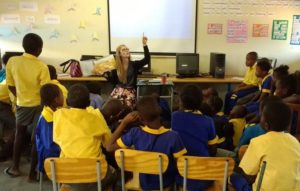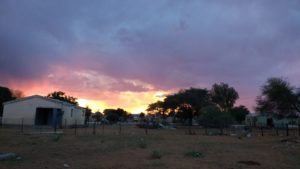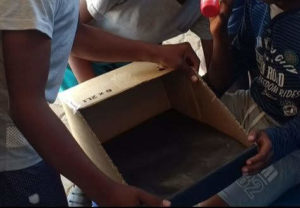Today’s blog is brought to us by and alumus of Dane County Youth Apprenticeship Program, Aidan Holmes.
In this blog I have the opportunity to write about how my experiences at the BTC Institute as a high school student were instrumental in leading me to my passion for science education, my Peace Corps experience, and my current role as a biotechnology instructor for the very same institute.
I became familiar with the BTC Institute as a student at Marshall High School when our biology teacher organized a biotechnology field trip for us. I loved learning about DNA and biotechnology since 7th grade so attending a field trip like this was an incredible opportunity to engage in hands-on biotechnology. When I learned about the Youth Apprenticeship Program in Biotechnology I knew I had to apply and enrolled during my senior year of high school. Through the program I took a weekly class at the BTC Institute  and I worked as a student researcher in a biochemistry lab at UW-Madison. I enrolled for classes at UW-Madison the following year and pursued an undergraduate degree in genetics and a certificate in education and educational services.
and I worked as a student researcher in a biochemistry lab at UW-Madison. I enrolled for classes at UW-Madison the following year and pursued an undergraduate degree in genetics and a certificate in education and educational services.
While in university, I continued working as a student researcher in biochemistry for three years. Over most of my summers, I was an LTE for the Sun Prairie summer library program, the first of which being the science-themed, “Fizz, Boom, Read!” Program. I loved talking with kids about their favorite science books and topics and sought out more experiences like it during the school year. I volunteered and worked for WiScience programs and UW-Madison’s Biotechnology Center among participating in other science outreach events on campus. In my senior year I worked in education research where I developed resources for middle school science teachers to implement in their classroom. I was able to listen to student/teacher conversations as part of our data collection and remember thinking, “THOSE are the conversations I want to have every day!”

As I approached graduation I hoped my experiences in college would be enough to find out what I wanted to do next as I started job seeking. They were not. I felt I needed more experience as a global citizen and knew I had more to learn before I could make further choices regarding my future career. The only next step that felt right was to apply for the United States Peace Corps.
I checked the box on my application that said, “send me anywhere!” and for me, anywhere was Namibia, Africa. Three months after graduating I flew to Namibia for a training period immersed in a new culture, learning a new language, and figuring out how to teach in a Namibian classroom. Not long after I moved to a village and began my service as a Natural Science and Health Education teacher.
Throughout my service I learned a lot outside of and inside of the classroom. Outside of the classroom I became a better advocate for myself and grew a stronger idea of what I was or was not willing to compromise in my future. I found strength, developed coping mechanisms, and discovered more about myself and the world around me.
Inside the classroom, my experience teaching in Namibia came with lots of challenges. Often, we didn’t have the time, space, or resources to have consistent high-level learning experiences. I was challenged regularly with situations that were rooted in endemic problems beyond our classroom from limited preliminary math or language proficiency for the content to inconsistent classes in blistering heat that kept the students and myself much more prone to falling asleep than being ready for a science lesson. On one hand, I recognized I didn’t have the time or experience to effectively overcome these challenges completely.
On the other hand, it pushed me to write engaging, meaningful, and student-centered lessons while I could. I looked forward to seeing my science students everyday and planning hands-on activities for them. I loved seeing the pride my students took in organizing their exercise books, hearing their small group discussions in class, and engaging their creative thinking and problem solving when they were faced with a task. Seeing my student’s passion for science learning affirmed my commitment to and the importance of science education.
 At the end of my Peace Corps service, I knew I wanted to return home to Wisconsin. I also knew I wanted to continue teaching, but outside of a classroom setting. My position at the BTC Institute is exactly what I was hoping for when I was planning my next steps after Peace Corps. The BTC Institute’s mission of supporting science understanding, making science accessible, and providing meaningful learning experiences aligned with what I wanted to do for my students. This position allows me to take my classroom skills and experiences and meld them to this accessible learning space as I continue to learn and grow in my role. I benefited from the opportunities the BTC Institute provided me as a student and I’m so fortunate to be giving back to the institute as an instructor and to pass on my passion to every group I work with.
At the end of my Peace Corps service, I knew I wanted to return home to Wisconsin. I also knew I wanted to continue teaching, but outside of a classroom setting. My position at the BTC Institute is exactly what I was hoping for when I was planning my next steps after Peace Corps. The BTC Institute’s mission of supporting science understanding, making science accessible, and providing meaningful learning experiences aligned with what I wanted to do for my students. This position allows me to take my classroom skills and experiences and meld them to this accessible learning space as I continue to learn and grow in my role. I benefited from the opportunities the BTC Institute provided me as a student and I’m so fortunate to be giving back to the institute as an instructor and to pass on my passion to every group I work with.
Latest posts by Promega (see all)
- Accurate and On-Time: A Look Inside Promega Logistics - June 24, 2025
- Augmenting Human Capabilities with AI Tools - June 17, 2025
- Lead with Empathy: Supporting Caregivers in the Workplace - June 3, 2025

I know a bright 10th grade student at East High School that would like to get involved in your apprentice program. How can he do this?
Thank you, Betsy Haynes
betsyhaynes@gmail.com
608-843-0399
Hi Betsy,The best way to get information is to contact the folks at BTCI.org who run the program. Phone: 608-273-9737 e-mail: btci@btci.org